牛津深圳版七年级下册 Module 2 Unit 3 Our animal friends. 知识点课件 (共54张PPT)
文档属性
| 名称 | 牛津深圳版七年级下册 Module 2 Unit 3 Our animal friends. 知识点课件 (共54张PPT) |  | |
| 格式 | zip | ||
| 文件大小 | 22.3MB | ||
| 资源类型 | 教案 | ||
| 版本资源 | 牛津深圳版 | ||
| 科目 | 英语 | ||
| 更新时间 | 2022-08-16 14:36:01 | ||
图片预览

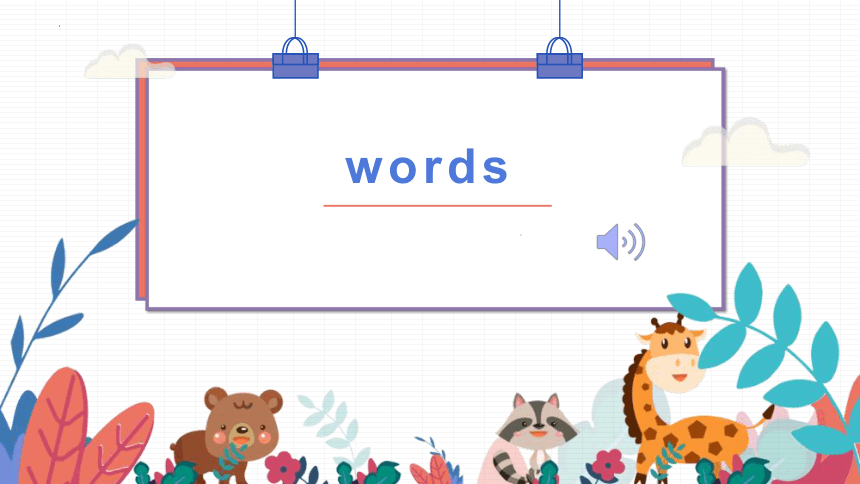
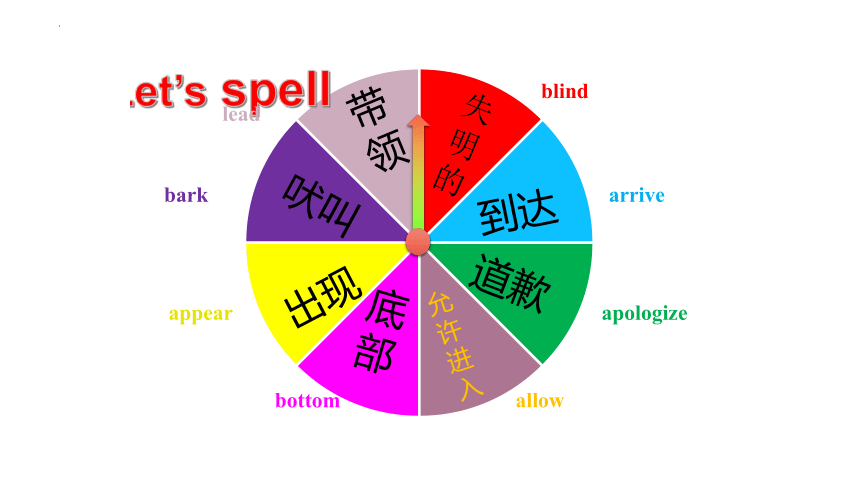
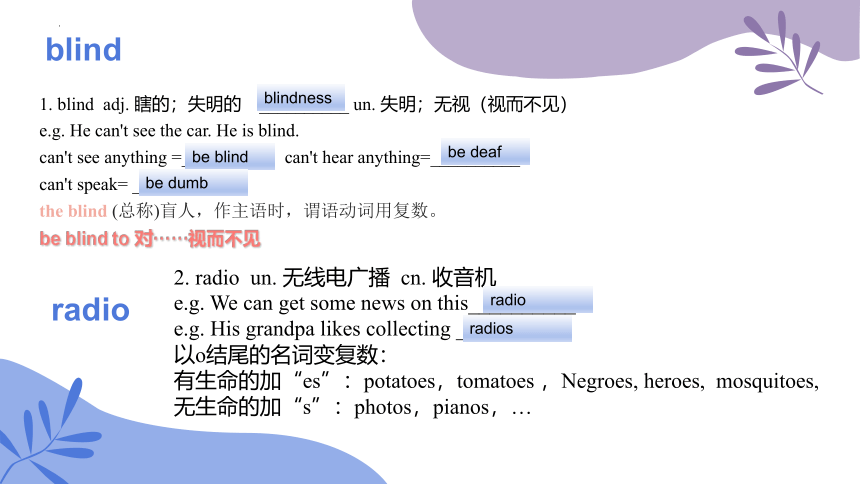
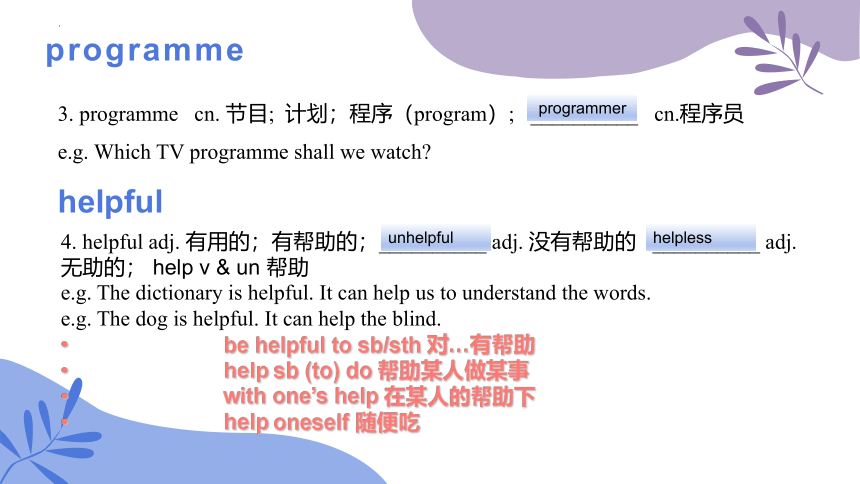

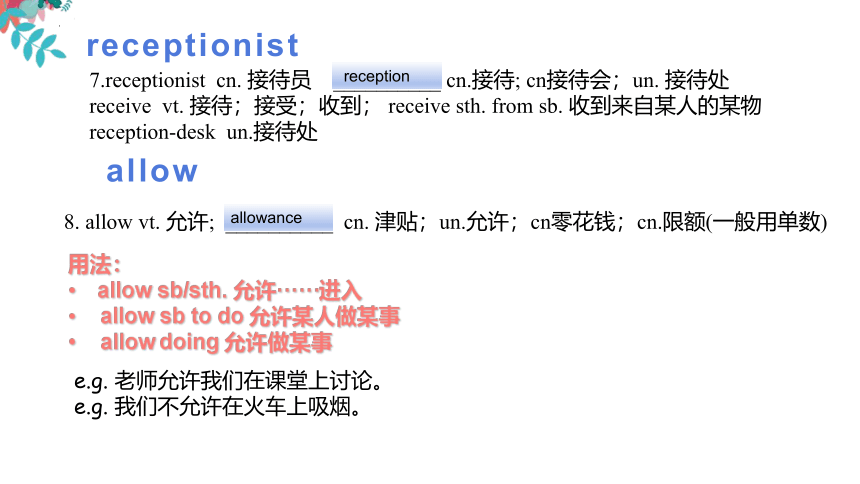
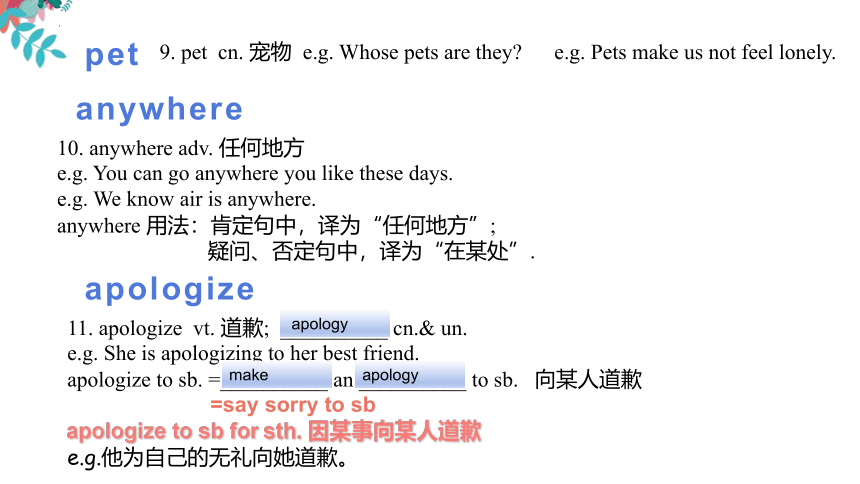
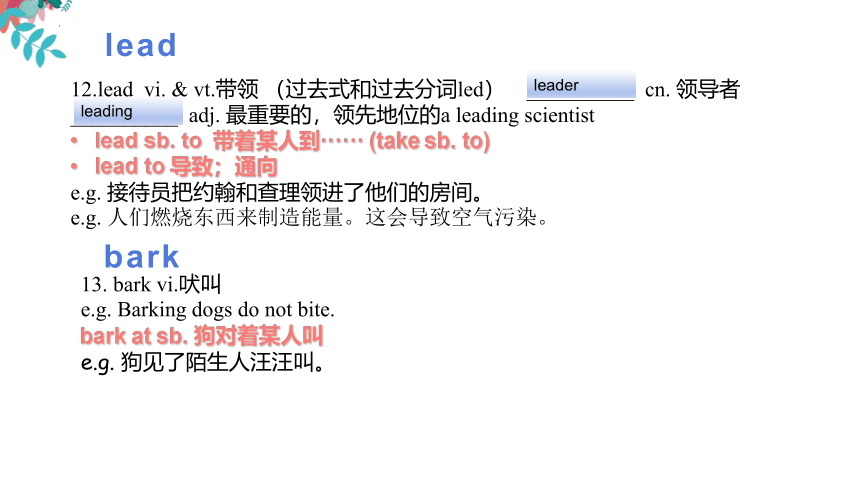

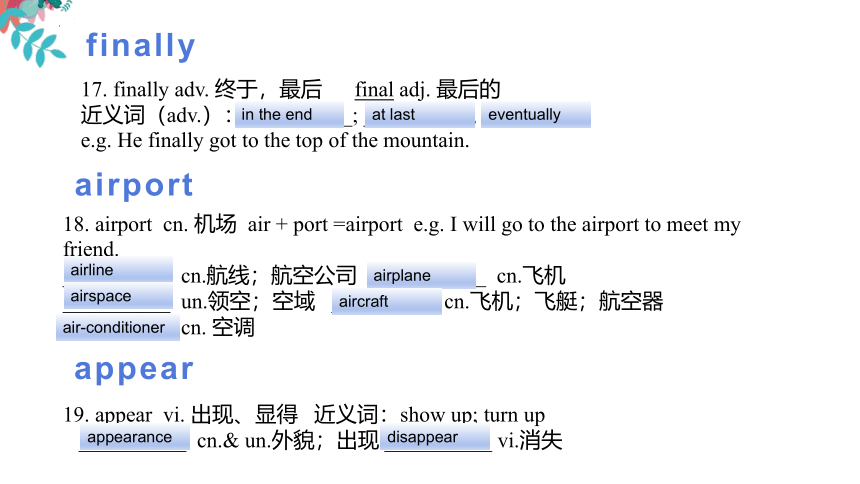
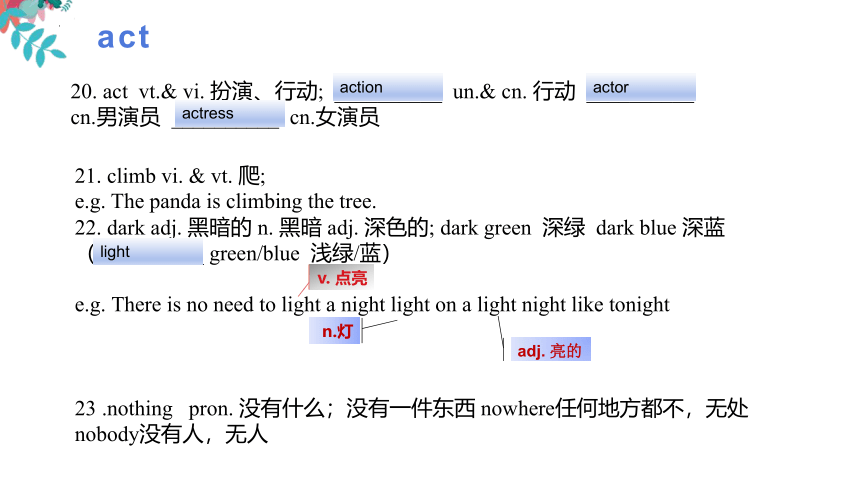
文档简介
(共54张PPT)
Unit 3
Aniamal Friends
words
blind
apologize
bottom
bark
lead
arrive
allow
appear
1. blind adj. 瞎的;失明的 __________ un. 失明;无视(视而不见)
e.g. He can't see the car. He is blind.
can't see anything =__________ can't hear anything=__________
can't speak= __________
the blind (总称)盲人,作主语时,谓语动词用复数。
be blind to 对······视而不见
blind
blindness
be blind
be deaf
be dumb
radio
2. radio un. 无线电广播 cn. 收音机
e.g. We can get some news on this__________.
e.g. His grandpa likes collecting __________.
以o结尾的名词变复数:
有生命的加“es”:potatoes,tomatoes ,Negroes, heroes, mosquitoes,
无生命的加“s”:photos,pianos,…
radio
radios
programme
helpful
3. programme cn. 节目; 计划;程序(program); __________ cn.程序员
e.g. Which TV programme shall we watch
4. helpful adj. 有用的;有帮助的;__________ adj. 没有帮助的 __________ adj. 无助的; help v & un 帮助
e.g. The dictionary is helpful. It can help us to understand the words.
e.g. The dog is helpful. It can help the blind.
be helpful to sb/sth 对…有帮助
help sb (to) do 帮助某人做某事
with one’s help 在某人的帮助下
help oneself 随便吃
programmer
unhelpful
helpless
rescue
mean
5. rescue cn.& un. 营救 vt .营救
e.g. He rescued her from drowning.
rescue sb from.... 从...中救起
6. mean vt. 表示...的意思;打算 (过去式和过去分词meant)
__________ cn.& un. 意思, 含义
what do you mean by...?
=what do/does ...mean
=what is the meaning of sth
e.g.这个单词什么意思?
mean to do sth. = intend to do sth. 打算做某事
e.g.我打算明天去北京。
mean doing sth意味着做某事
e.g.成功意味着努力工作
meaning
what do you think the word “eyes” means in the story (P30)
1.插入语,独立成分,去掉不影响句意。
2.后面的句子要用陈述语序。
receptionist
7.receptionist cn. 接待员 __________ cn.接待; cn接待会;un. 接待处
receive vt. 接待;接受;收到; receive sth. from sb. 收到来自某人的某物
reception-desk un.接待处
8. allow vt. 允许; __________ cn. 津贴;un.允许;cn零花钱;cn.限额(一般用单数)
allow
reception
用法:
allow sb/sth. 允许······进入
allow sb to do 允许某人做某事
allow doing 允许做某事
e.g. 老师允许我们在课堂上讨论。
e.g. 我们不允许在火车上吸烟。
allowance
pet
9. pet cn. 宠物 e.g. Whose pets are they e.g. Pets make us not feel lonely.
anywhere
10. anywhere adv. 任何地方
e.g. You can go anywhere you like these days.
e.g. We know air is anywhere.
anywhere 用法:肯定句中,译为“任何地方”;
疑问、否定句中,译为“在某处”.
11. apologize vt. 道歉; __________ cn.& un.
e.g. She is apologizing to her best friend.
apologize to sb. =__________ an __________ to sb. 向某人道歉
=say sorry to sb
apologize to sb for sth. 因某事向某人道歉
e.g.他为自己的无礼向她道歉。
apologize
apology
make
apology
lead
bark
12.lead vi. & vt.带领 (过去式和过去分词led) __________ cn. 领导者
__________ adj. 最重要的,领先地位的a leading scientist
lead sb. to 带着某人到······ (take sb. to)
lead to 导致;通向
e.g. 接待员把约翰和查理领进了他们的房间。
e.g. 人们燃烧东西来制造能量。这会导致空气污染。
leader
leading
13. bark vi.吠叫
e.g. Barking dogs do not bite.
bark at sb. 狗对着某人叫
e.g. 狗见了陌生人汪汪叫。
14. wake vi.&vt. 醒来 (过去式woke;过去分词woken)
wake up sb.= wake sb. up 唤醒某人(人称代词宾格放中间)
awake adj. 醒着的 ;vi&vt 唤醒(过去式awoke,过去分词 awoken);
e.g. The child ______ three times during the night.
e.g. His mother ________ him up every morning.
wake
15. towel cn. 毛巾 e.g. She likes the red towel.
16. bottom cn. 底部 adj. 底部的
the bottom of... ······的底部
from the bottom of one’s heart 衷心地
John put some wet towels along __________ the door.
约翰在门的底部放了一些湿毛巾。
They thanked the doctors ________________.
他们衷心地感谢医生。
bottom
finally
airport
17. finally adv. 终于,最后 final adj. 最后的
近义词(adv.):__________; __________; __________
e.g. He finally got to the top of the mountain.
in the end
at last
eventually
18. airport cn. 机场 air + port =airport e.g. I will go to the airport to meet my friend.
__________ cn.航线;航空公司 __________ cn.飞机
__________ un.领空;空域 __________ cn.飞机;飞艇;航空器 __________ cn. 空调
airline
airplane
airspace
aircraft
air-conditioner
19. appear vi. 出现、显得 近义词:show up; turn up
__________ cn.& un.外貌;出现 __________ vi.消失
appear
appearance
disappear
act
20. act vt.& vi. 扮演、行动; __________ un.& cn. 行动 __________ cn.男演员 __________ cn.女演员
action
actor
actress
21. climb vi. & vt. 爬;
e.g. The panda is climbing the tree.
22. dark adj. 黑暗的 n. 黑暗 adj. 深色的; dark green 深绿 dark blue 深蓝 (__________ green/blue 浅绿/蓝)
e.g. There is no need to light a night light on a light night like tonight
23 .nothing pron. 没有什么;没有一件东西 nowhere任何地方都不,无处 nobody没有人,无人
light
v. 点亮
n.灯
adj. 亮的
arrive at到达
by oneself独自
lead (sb.) to带着(某人)到...
fall asleep入睡
wake up醒来
get down蹲下
fire engine消防车
Exercises
I. 根据所给提示填空。
1. He passed the exam _____________ his sister’s help.
2. Jenny watched a very interesting TV p__________ last night.
3. We all know that the red light m____________ “Stop”.
4. After lunch, she cleaned the table with a wet ___________ (毛巾).
5. Linda _____________ (道歉) to her brother for forgetting his birthday.
6. The man next to Jack keeps a monkey as a ___________ (宠物).
7. As a r_____________, her job was just answering phones and delivering some papers to offices.
8. If you don’t have a ticket, they will not a____________ you into the zoo.
with / without
rogramme
eans
llow
pet
towel
apologized
eceptionist
9. I can’t go a__________ without the help of a map.
10. Parents shouldn’t let their young children stay at home by t___________.
11. You must a__________ to Mr. Zhang for being late again.
12. The guard l__________ us around the whole campus.
13. The porter l___________ the old man to the toilet.
14. Sally went to bed and fell a__________ at once.
15. Some dogs are quiet and they never b__________ at night.
16. He was too tired and w__________ up very late the next morning.
17. Boy, please use the t___________ to wash your face.
18. B__________ is the opposite of “top”.
19. They dialed 911 and the fire e__________ turned up in five minutes.
20. Two hours later, the pop singer f___________ appeared on the stage.
21. The director chose a new a___________ to star the movie.
22. Jack did n___________ to help me out but joked about everything I did.
nywhere
ed
sleep
ark
oke
owel
ottom
ngine(s)
inally
ctor
othing
hemselves
pologize
ed/leads
1.The little boy broke Miss White’s window, so he must her.
2. My parents don’t me to go out at night.
3. A guide dog can help people do many things.
4. Last night Simon on TV.
5. Your advice is very for me.
6.I will you up at six o'clock tomorrow morning.
Fill the blanks
apologize to
blind
allow
appeared
helpful
wake
by oneself
helpful
anywhere
arrive at
lead
next to
by himself
helpful
anywhere
leads
arrive at
next to
Fill the blanks
Reading
Every dog has its day!
1. One day, John Dancer and Charlie arrived at a hotel.
arrive at +小地方
arrive in +大地方
get to +地点
reach + 地点
1.Did you ______ at the bus stop
2.When they ______the top of the hill, it was dark.
arrive
reach
arrive /get后+地点副词here,there, home不加介词
2.“Good evening, sir,” said the receptionist.
“You’re welcome to stay, but I’m sorry that we don’t allow pets here.”
1. welcome adj 受欢迎的
You are welcome 不用谢(回答感谢)
v. 欢迎 e.g.they welcome us with flowers.
n. 欢迎.e.g. a warm welcome
welcome to +地点
2. be sorry (that)+从句 对...感到抱歉
e.g.很抱歉我迟到了。
be sorry to do sth抱歉做某事
be sorry about sth对某事感到遗憾
be sorry for sb 为某人感到同情,同情,怜悯
I'm sorry to hear that我感到很难过/遗憾
3. allow sth
allow sb (not) to do sth (不)允许某人做某事妈妈不允许我在家里养狗。
Mum ______ ____ ____ ____ ____ ____ at home.
allow doing sth 允许做某事
doesn’t allow me to keep dogs
4.keep pets/animals 养宠物
=raise pets/animals
2).by oneself 某人自己……
=on one’s own=alone
by myself
enjoy oneself 玩得高兴
help oneself to 随便吃、随便用
teach oneself = learn by oneself自学
2. “I’m blind and I can’t go anywhere by myself.”
1).anywhere “任何地方”(用于否定句和疑问句中)
somewhere(肯定句), nowhere(=not...any where)
我自己能行。
I can do it ___ ______.
myself 我自己
yourself 你自己
ourselves 我们自己
herself 她自己
himself 他自己
themselves 他们自己
3.The receptionist apologized and led John and Charlie to their room.
1.apologize=
e.g: 昨天,我跟爸爸道歉了。
Yesterday, I_______ ____ my father.
由于打破了这个窗户的玻璃,我向这位老人道歉了。
I _________the old man ___ breaking the glass of
the window.
apologized to
apologized
for
2. lead...to...
过去式
lead to
4.John was very tired. He soon fell asleep. Some time later, Charlie started barking.
1.fall asleep 入睡,睡着。强调睡着了的状态
go to sleep入睡,强调动作;
go to bed 上床睡觉,强调上床睡觉这个动作,不能与表示一段时间的状语连用
我昨天很早上床睡觉了,但是半夜很晚才睡着。
I _____ ___ _____ early , but I ____ ______ late at midnight yesterday.
went to bed
fell asleep
some time later 一段时间之后
some time 一段时间
sometime 某个时候
sometimes 有时候
some times 很多次
e.g. 我们还有一些时间去做作业。
We have____ _____ to do homework.
e.g. 为了参加比赛,他们练习了很多次。
To take part in the competition,
they practiced ___ ________.
some time
some times
5.John woke up and smelt smoke. A fire! Smoke started to come in from under the door.With Charlie’s help, John put some wet towels along the bottom of the door. Then he got down on the floor next to Charlie and waited.
with one’s help 在某人的帮助下
= with the help of
without one’s help 没有某人的帮助
在他妹妹的帮助下,他通过了考试。
He passed the exam _____ ____ ______ ____.
He passed the exam ___ ____ ____ __ __ _____.
with his sister's help
with the help of his sister
6.Soon he heard the sound of a fire engine. A fireman arrived and got him out of the building,but the fireman did not want to take Charlie. John would not go without his “eyes”.
sound/noise/voice
get...out of...使...从...出去
get out of 离开...<反>get into
would not do sth 不肯做某事,不愿做某事
7.Finally, the fireman got Charlie out of the building too and they were both safe.
both 两者都
both…… and意思是:_________
Tom和Mary都喜欢看电视。
_____Tom_____Mary____watching TV.
2) be both 两者都……
我们都是学生。We ___ _____ students.
3)both of +宾格 两者都……
____ ___ __ are students.
两者都……
Both
and
like
are both
Both of us
safe
safety
safely
单击此处添加标题
1. fell asleep
2. can; nowhere alone
3. help of;fireman
4.to bark,John up
5. said sorry to
6.is the meaning of
7. on their own
at times
9. next to
10. aren't allowed to
1. alone;began
2. to;but
3. John woke up and smelt smoke
4.①
5. they were both
Grammar
方位介词&反身代词
Hello everyone!I'm Tom.
I live with Mrs White in a big house.I like catching mice,but I'm not good at it.
Can you tell me where Jerry is
Let's catch him today!
It's ____ the bottle.
in
在...里面,内部
Where is Jerry
It's _______ the cheese.
under
在...的下面
It's ____Tom's head.
on
在...上面(有接触)
It's _____ Tom's head.
above
在...上面(不接触 悬空)
Where is Jerry now
Where is Jerry
It's ______________ Tom.
next to / beside
next to / beside: 在...旁边
Where is Jerry
It's ________ Tom.
behind
in front of
behind:在...后面
It's __________ Tom.
in front of : 在...前面
Where is Jerry
It's _________ Tom and the dog.
between
between: 在...两者之间
I can't catch Jerry. He is so smart.But I learnt prepositions of position today.
in 在...里面
on 在...上面(有接触)
above 在...上面(无接触 悬空)
under 在...下面
behind 在...后面
in front of 在...前面
between 在...之间(两者)
next to / beside 在...旁边
常用短语:
in bed 卧床
in hospital 生病住院
in prison 入狱
in the sky 在空中
in space 在太空中
in the world在世界上
in the middle/centre of 在...的中间
常用短语:
on the wall/shelf在墙上/架子上
on the first floor在一楼
on the radio在广播里
on TV在电视上
on a bus/train/plane/ship在公车/火车/飞机/轮船上
on a trip在旅途中
常用短语:
at the airport在机场
at the doctor's在诊所
at the hotel在酒店
at home在家
at school在学校
at the bus stop在公交站
at the foot of在...脚下
at the end of在...结尾
in front of
behind
in the front of
in the back of
between
among
around
on the left/right
III. 用适当的方位介词填空。
1. The twins usually stand _________ their parents, and their parents are in the middle.
2. There is a map of China ___________ the wall of our classroom.
3. Before 2000, there was no airline ____________ the two cities.
4. There are some beautiful flowers __________ our house.
5. She will leave her homework __________ the teacher’s desk after school today.
6. Mr. Smith lives _________ that building. His flat is ________ the fifth floor.
7. The boy is taller than his friend, so he sits _________ him in the classroom.
8. He put a painting on the wall __________ the sofa.
9. The plane flew ____________ the clouds.
beside
between
around
on
on
in
behind
above
over
on
In groups,
tell your classmates about yourself.
I can’t go anywhere by myself.”
We will have to tie ourselves to our beds
反身代词
I am smart because I study hard and I have a very good memory
(记忆力)! Do you still remember these sentences
反身代词基本形式
单数 复数
第一人称
第二人称
第三人称
myself
ourselves
yourself
yourselves
himself herself itself
themselves
We can work out the rule:
单数反身代词以________结尾。
复数反身代词以________结尾。
-self
-selves
反身代词的用法
Tip 1 :
He can clean the room himself.
They can cook food themselves.
他能够独自打扫房间。
他们能够独自烹饪食物。
我们将反身代词放在句末来强调某人独自做某事而不需帮助。
Tip 2 :
We should not think only of ourselves.
我们也用反身代词放在动词或介词后作宾语,来反指主语。
She made herself a cup of coffee.
她给她自己做了一杯咖啡。
我们不应该只考虑我们自己。
Tom is talking to himself.
Tom 正在和他自己说话。
Tip 3 :有关反身代词的固定短语
1. by oneself 独自(句末)=on one's own=alone
2. enjoy oneself 玩的开心
3. help oneself to + 食物 随便吃,请自便
4. talk to oneself 自言自语
5. look at oneself in the mirror 照镜子
6. look after oneself 照顾某人自己
7. teach oneself / learn by oneself 自学
8. dress oneself 给某人自己穿衣服
9. make oneself at home 别客气 像在家一样
Hey guys! I am going to tell you something more about _______. I like talking to ______. I like eating cakes. Mrs White always makes them by ______ for me. She is smart. She taught ______ Chinese. We always enjoy _______ together!
myself
myself
herself
herself
ourselves
Please fill in the blanks with proper reflexive pronouns.
1. The little kid is just 2 years old. He's too young to take care of ______.
A. his B. him C. himself
2. Look at the birthday card. I made it _____.
A. myself B. me C. mine
3. Miss Li teaches ______ English and we always enjoy _____ in her class.
A. my, ourselves B. us, ourselves C. us, us
C
A
B
请用括号中词的适当形式填空
I like looking at ______ (I) in the mirror.
I am clever and I am proud of ______ (I).
I am going to visit my brother tomorrow.
He lives by _______(he),
but ______(he) house is very big.
His bed is bigger than _______ (I),too.
I will miss Tom!
myself
myself
himself
his
mine
think of想起,认为,考虑
think about 考虑
think over 仔细考虑
no one 没有人=nobody
作主语 谓语用单数
no one只能回答以who开头的问句。
不可以与of连用
feel proud of
1.really=very/actually
2.past 介词 超过 形容词 过去的 以前的 名词 过去 以前 in the past 在过去
3.see sb/sth doing sth
see sb/sth do sth
4.large=big
5.scared=afraid
7.push推<反>pull
8.follow=go after
6.appear=come out
9.as soon as 一...就...主将从现;主过从过
Unit 3
Aniamal Friends
words
blind
apologize
bottom
bark
lead
arrive
allow
appear
1. blind adj. 瞎的;失明的 __________ un. 失明;无视(视而不见)
e.g. He can't see the car. He is blind.
can't see anything =__________ can't hear anything=__________
can't speak= __________
the blind (总称)盲人,作主语时,谓语动词用复数。
be blind to 对······视而不见
blind
blindness
be blind
be deaf
be dumb
radio
2. radio un. 无线电广播 cn. 收音机
e.g. We can get some news on this__________.
e.g. His grandpa likes collecting __________.
以o结尾的名词变复数:
有生命的加“es”:potatoes,tomatoes ,Negroes, heroes, mosquitoes,
无生命的加“s”:photos,pianos,…
radio
radios
programme
helpful
3. programme cn. 节目; 计划;程序(program); __________ cn.程序员
e.g. Which TV programme shall we watch
4. helpful adj. 有用的;有帮助的;__________ adj. 没有帮助的 __________ adj. 无助的; help v & un 帮助
e.g. The dictionary is helpful. It can help us to understand the words.
e.g. The dog is helpful. It can help the blind.
be helpful to sb/sth 对…有帮助
help sb (to) do 帮助某人做某事
with one’s help 在某人的帮助下
help oneself 随便吃
programmer
unhelpful
helpless
rescue
mean
5. rescue cn.& un. 营救 vt .营救
e.g. He rescued her from drowning.
rescue sb from.... 从...中救起
6. mean vt. 表示...的意思;打算 (过去式和过去分词meant)
__________ cn.& un. 意思, 含义
what do you mean by...?
=what do/does ...mean
=what is the meaning of sth
e.g.这个单词什么意思?
mean to do sth. = intend to do sth. 打算做某事
e.g.我打算明天去北京。
mean doing sth意味着做某事
e.g.成功意味着努力工作
meaning
what do you think the word “eyes” means in the story (P30)
1.插入语,独立成分,去掉不影响句意。
2.后面的句子要用陈述语序。
receptionist
7.receptionist cn. 接待员 __________ cn.接待; cn接待会;un. 接待处
receive vt. 接待;接受;收到; receive sth. from sb. 收到来自某人的某物
reception-desk un.接待处
8. allow vt. 允许; __________ cn. 津贴;un.允许;cn零花钱;cn.限额(一般用单数)
allow
reception
用法:
allow sb/sth. 允许······进入
allow sb to do 允许某人做某事
allow doing 允许做某事
e.g. 老师允许我们在课堂上讨论。
e.g. 我们不允许在火车上吸烟。
allowance
pet
9. pet cn. 宠物 e.g. Whose pets are they e.g. Pets make us not feel lonely.
anywhere
10. anywhere adv. 任何地方
e.g. You can go anywhere you like these days.
e.g. We know air is anywhere.
anywhere 用法:肯定句中,译为“任何地方”;
疑问、否定句中,译为“在某处”.
11. apologize vt. 道歉; __________ cn.& un.
e.g. She is apologizing to her best friend.
apologize to sb. =__________ an __________ to sb. 向某人道歉
=say sorry to sb
apologize to sb for sth. 因某事向某人道歉
e.g.他为自己的无礼向她道歉。
apologize
apology
make
apology
lead
bark
12.lead vi. & vt.带领 (过去式和过去分词led) __________ cn. 领导者
__________ adj. 最重要的,领先地位的a leading scientist
lead sb. to 带着某人到······ (take sb. to)
lead to 导致;通向
e.g. 接待员把约翰和查理领进了他们的房间。
e.g. 人们燃烧东西来制造能量。这会导致空气污染。
leader
leading
13. bark vi.吠叫
e.g. Barking dogs do not bite.
bark at sb. 狗对着某人叫
e.g. 狗见了陌生人汪汪叫。
14. wake vi.&vt. 醒来 (过去式woke;过去分词woken)
wake up sb.= wake sb. up 唤醒某人(人称代词宾格放中间)
awake adj. 醒着的 ;vi&vt 唤醒(过去式awoke,过去分词 awoken);
e.g. The child ______ three times during the night.
e.g. His mother ________ him up every morning.
wake
15. towel cn. 毛巾 e.g. She likes the red towel.
16. bottom cn. 底部 adj. 底部的
the bottom of... ······的底部
from the bottom of one’s heart 衷心地
John put some wet towels along __________ the door.
约翰在门的底部放了一些湿毛巾。
They thanked the doctors ________________.
他们衷心地感谢医生。
bottom
finally
airport
17. finally adv. 终于,最后 final adj. 最后的
近义词(adv.):__________; __________; __________
e.g. He finally got to the top of the mountain.
in the end
at last
eventually
18. airport cn. 机场 air + port =airport e.g. I will go to the airport to meet my friend.
__________ cn.航线;航空公司 __________ cn.飞机
__________ un.领空;空域 __________ cn.飞机;飞艇;航空器 __________ cn. 空调
airline
airplane
airspace
aircraft
air-conditioner
19. appear vi. 出现、显得 近义词:show up; turn up
__________ cn.& un.外貌;出现 __________ vi.消失
appear
appearance
disappear
act
20. act vt.& vi. 扮演、行动; __________ un.& cn. 行动 __________ cn.男演员 __________ cn.女演员
action
actor
actress
21. climb vi. & vt. 爬;
e.g. The panda is climbing the tree.
22. dark adj. 黑暗的 n. 黑暗 adj. 深色的; dark green 深绿 dark blue 深蓝 (__________ green/blue 浅绿/蓝)
e.g. There is no need to light a night light on a light night like tonight
23 .nothing pron. 没有什么;没有一件东西 nowhere任何地方都不,无处 nobody没有人,无人
light
v. 点亮
n.灯
adj. 亮的
arrive at到达
by oneself独自
lead (sb.) to带着(某人)到...
fall asleep入睡
wake up醒来
get down蹲下
fire engine消防车
Exercises
I. 根据所给提示填空。
1. He passed the exam _____________ his sister’s help.
2. Jenny watched a very interesting TV p__________ last night.
3. We all know that the red light m____________ “Stop”.
4. After lunch, she cleaned the table with a wet ___________ (毛巾).
5. Linda _____________ (道歉) to her brother for forgetting his birthday.
6. The man next to Jack keeps a monkey as a ___________ (宠物).
7. As a r_____________, her job was just answering phones and delivering some papers to offices.
8. If you don’t have a ticket, they will not a____________ you into the zoo.
with / without
rogramme
eans
llow
pet
towel
apologized
eceptionist
9. I can’t go a__________ without the help of a map.
10. Parents shouldn’t let their young children stay at home by t___________.
11. You must a__________ to Mr. Zhang for being late again.
12. The guard l__________ us around the whole campus.
13. The porter l___________ the old man to the toilet.
14. Sally went to bed and fell a__________ at once.
15. Some dogs are quiet and they never b__________ at night.
16. He was too tired and w__________ up very late the next morning.
17. Boy, please use the t___________ to wash your face.
18. B__________ is the opposite of “top”.
19. They dialed 911 and the fire e__________ turned up in five minutes.
20. Two hours later, the pop singer f___________ appeared on the stage.
21. The director chose a new a___________ to star the movie.
22. Jack did n___________ to help me out but joked about everything I did.
nywhere
ed
sleep
ark
oke
owel
ottom
ngine(s)
inally
ctor
othing
hemselves
pologize
ed/leads
1.The little boy broke Miss White’s window, so he must her.
2. My parents don’t me to go out at night.
3. A guide dog can help people do many things.
4. Last night Simon on TV.
5. Your advice is very for me.
6.I will you up at six o'clock tomorrow morning.
Fill the blanks
apologize to
blind
allow
appeared
helpful
wake
by oneself
helpful
anywhere
arrive at
lead
next to
by himself
helpful
anywhere
leads
arrive at
next to
Fill the blanks
Reading
Every dog has its day!
1. One day, John Dancer and Charlie arrived at a hotel.
arrive at +小地方
arrive in +大地方
get to +地点
reach + 地点
1.Did you ______ at the bus stop
2.When they ______the top of the hill, it was dark.
arrive
reach
arrive /get后+地点副词here,there, home不加介词
2.“Good evening, sir,” said the receptionist.
“You’re welcome to stay, but I’m sorry that we don’t allow pets here.”
1. welcome adj 受欢迎的
You are welcome 不用谢(回答感谢)
v. 欢迎 e.g.they welcome us with flowers.
n. 欢迎.e.g. a warm welcome
welcome to +地点
2. be sorry (that)+从句 对...感到抱歉
e.g.很抱歉我迟到了。
be sorry to do sth抱歉做某事
be sorry about sth对某事感到遗憾
be sorry for sb 为某人感到同情,同情,怜悯
I'm sorry to hear that我感到很难过/遗憾
3. allow sth
allow sb (not) to do sth (不)允许某人做某事妈妈不允许我在家里养狗。
Mum ______ ____ ____ ____ ____ ____ at home.
allow doing sth 允许做某事
doesn’t allow me to keep dogs
4.keep pets/animals 养宠物
=raise pets/animals
2).by oneself 某人自己……
=on one’s own=alone
by myself
enjoy oneself 玩得高兴
help oneself to 随便吃、随便用
teach oneself = learn by oneself自学
2. “I’m blind and I can’t go anywhere by myself.”
1).anywhere “任何地方”(用于否定句和疑问句中)
somewhere(肯定句), nowhere(=not...any where)
我自己能行。
I can do it ___ ______.
myself 我自己
yourself 你自己
ourselves 我们自己
herself 她自己
himself 他自己
themselves 他们自己
3.The receptionist apologized and led John and Charlie to their room.
1.apologize=
e.g: 昨天,我跟爸爸道歉了。
Yesterday, I_______ ____ my father.
由于打破了这个窗户的玻璃,我向这位老人道歉了。
I _________the old man ___ breaking the glass of
the window.
apologized to
apologized
for
2. lead...to...
过去式
lead to
4.John was very tired. He soon fell asleep. Some time later, Charlie started barking.
1.fall asleep 入睡,睡着。强调睡着了的状态
go to sleep入睡,强调动作;
go to bed 上床睡觉,强调上床睡觉这个动作,不能与表示一段时间的状语连用
我昨天很早上床睡觉了,但是半夜很晚才睡着。
I _____ ___ _____ early , but I ____ ______ late at midnight yesterday.
went to bed
fell asleep
some time later 一段时间之后
some time 一段时间
sometime 某个时候
sometimes 有时候
some times 很多次
e.g. 我们还有一些时间去做作业。
We have____ _____ to do homework.
e.g. 为了参加比赛,他们练习了很多次。
To take part in the competition,
they practiced ___ ________.
some time
some times
5.John woke up and smelt smoke. A fire! Smoke started to come in from under the door.With Charlie’s help, John put some wet towels along the bottom of the door. Then he got down on the floor next to Charlie and waited.
with one’s help 在某人的帮助下
= with the help of
without one’s help 没有某人的帮助
在他妹妹的帮助下,他通过了考试。
He passed the exam _____ ____ ______ ____.
He passed the exam ___ ____ ____ __ __ _____.
with his sister's help
with the help of his sister
6.Soon he heard the sound of a fire engine. A fireman arrived and got him out of the building,but the fireman did not want to take Charlie. John would not go without his “eyes”.
sound/noise/voice
get...out of...使...从...出去
get out of 离开...<反>get into
would not do sth 不肯做某事,不愿做某事
7.Finally, the fireman got Charlie out of the building too and they were both safe.
both 两者都
both…… and意思是:_________
Tom和Mary都喜欢看电视。
_____Tom_____Mary____watching TV.
2) be both 两者都……
我们都是学生。We ___ _____ students.
3)both of +宾格 两者都……
____ ___ __ are students.
两者都……
Both
and
like
are both
Both of us
safe
safety
safely
单击此处添加标题
1. fell asleep
2. can; nowhere alone
3. help of;fireman
4.to bark,John up
5. said sorry to
6.is the meaning of
7. on their own
at times
9. next to
10. aren't allowed to
1. alone;began
2. to;but
3. John woke up and smelt smoke
4.①
5. they were both
Grammar
方位介词&反身代词
Hello everyone!I'm Tom.
I live with Mrs White in a big house.I like catching mice,but I'm not good at it.
Can you tell me where Jerry is
Let's catch him today!
It's ____ the bottle.
in
在...里面,内部
Where is Jerry
It's _______ the cheese.
under
在...的下面
It's ____Tom's head.
on
在...上面(有接触)
It's _____ Tom's head.
above
在...上面(不接触 悬空)
Where is Jerry now
Where is Jerry
It's ______________ Tom.
next to / beside
next to / beside: 在...旁边
Where is Jerry
It's ________ Tom.
behind
in front of
behind:在...后面
It's __________ Tom.
in front of : 在...前面
Where is Jerry
It's _________ Tom and the dog.
between
between: 在...两者之间
I can't catch Jerry. He is so smart.But I learnt prepositions of position today.
in 在...里面
on 在...上面(有接触)
above 在...上面(无接触 悬空)
under 在...下面
behind 在...后面
in front of 在...前面
between 在...之间(两者)
next to / beside 在...旁边
常用短语:
in bed 卧床
in hospital 生病住院
in prison 入狱
in the sky 在空中
in space 在太空中
in the world在世界上
in the middle/centre of 在...的中间
常用短语:
on the wall/shelf在墙上/架子上
on the first floor在一楼
on the radio在广播里
on TV在电视上
on a bus/train/plane/ship在公车/火车/飞机/轮船上
on a trip在旅途中
常用短语:
at the airport在机场
at the doctor's在诊所
at the hotel在酒店
at home在家
at school在学校
at the bus stop在公交站
at the foot of在...脚下
at the end of在...结尾
in front of
behind
in the front of
in the back of
between
among
around
on the left/right
III. 用适当的方位介词填空。
1. The twins usually stand _________ their parents, and their parents are in the middle.
2. There is a map of China ___________ the wall of our classroom.
3. Before 2000, there was no airline ____________ the two cities.
4. There are some beautiful flowers __________ our house.
5. She will leave her homework __________ the teacher’s desk after school today.
6. Mr. Smith lives _________ that building. His flat is ________ the fifth floor.
7. The boy is taller than his friend, so he sits _________ him in the classroom.
8. He put a painting on the wall __________ the sofa.
9. The plane flew ____________ the clouds.
beside
between
around
on
on
in
behind
above
over
on
In groups,
tell your classmates about yourself.
I can’t go anywhere by myself.”
We will have to tie ourselves to our beds
反身代词
I am smart because I study hard and I have a very good memory
(记忆力)! Do you still remember these sentences
反身代词基本形式
单数 复数
第一人称
第二人称
第三人称
myself
ourselves
yourself
yourselves
himself herself itself
themselves
We can work out the rule:
单数反身代词以________结尾。
复数反身代词以________结尾。
-self
-selves
反身代词的用法
Tip 1 :
He can clean the room himself.
They can cook food themselves.
他能够独自打扫房间。
他们能够独自烹饪食物。
我们将反身代词放在句末来强调某人独自做某事而不需帮助。
Tip 2 :
We should not think only of ourselves.
我们也用反身代词放在动词或介词后作宾语,来反指主语。
She made herself a cup of coffee.
她给她自己做了一杯咖啡。
我们不应该只考虑我们自己。
Tom is talking to himself.
Tom 正在和他自己说话。
Tip 3 :有关反身代词的固定短语
1. by oneself 独自(句末)=on one's own=alone
2. enjoy oneself 玩的开心
3. help oneself to + 食物 随便吃,请自便
4. talk to oneself 自言自语
5. look at oneself in the mirror 照镜子
6. look after oneself 照顾某人自己
7. teach oneself / learn by oneself 自学
8. dress oneself 给某人自己穿衣服
9. make oneself at home 别客气 像在家一样
Hey guys! I am going to tell you something more about _______. I like talking to ______. I like eating cakes. Mrs White always makes them by ______ for me. She is smart. She taught ______ Chinese. We always enjoy _______ together!
myself
myself
herself
herself
ourselves
Please fill in the blanks with proper reflexive pronouns.
1. The little kid is just 2 years old. He's too young to take care of ______.
A. his B. him C. himself
2. Look at the birthday card. I made it _____.
A. myself B. me C. mine
3. Miss Li teaches ______ English and we always enjoy _____ in her class.
A. my, ourselves B. us, ourselves C. us, us
C
A
B
请用括号中词的适当形式填空
I like looking at ______ (I) in the mirror.
I am clever and I am proud of ______ (I).
I am going to visit my brother tomorrow.
He lives by _______(he),
but ______(he) house is very big.
His bed is bigger than _______ (I),too.
I will miss Tom!
myself
myself
himself
his
mine
think of想起,认为,考虑
think about 考虑
think over 仔细考虑
no one 没有人=nobody
作主语 谓语用单数
no one只能回答以who开头的问句。
不可以与of连用
feel proud of
1.really=very/actually
2.past 介词 超过 形容词 过去的 以前的 名词 过去 以前 in the past 在过去
3.see sb/sth doing sth
see sb/sth do sth
4.large=big
5.scared=afraid
7.push推<反>pull
8.follow=go after
6.appear=come out
9.as soon as 一...就...主将从现;主过从过
